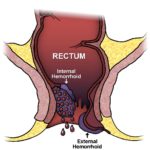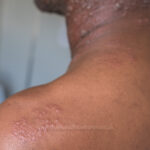Bad breath typically originates in the mouth, where bacteria are ever present. When you eat, bits of food get caught in your teeth. Bacteria grow on these bits of food, releasing foul-smelling sulfur compounds. The most common cause of bad breath is poor dental hygiene. If you don’t brush and floss often, the bacteria in your mouth continue to grow, and a thin film of bacteria known as plaque builds up on your teeth. When plaque isn’t brushed away at least twice per day, it produces a foul odor and leads to another smelly process, tooth decay.
Some people are convinced they have bad breath when their breath is completely neutral while others have terrible breath and don’t know it. Although, it can be hard to smell your own breath, let alone judge its odor, the easiest thing you can do to avoid someone scrunching their nose in a gathering any time you speak is to ask someone you trust to give you an honest opinion and remember do not take it the hard way, it’s for your own good! If your suspicions are confirmed and your breath is problematic, don’t worry. There are many home remedies that can eliminate bad breath. So, let’s talk about four home remedies for bad breath.
HOME REMEDIES FOR BAD BREATH
Good Dental Hygiene: According to research, poor dental hygiene is the most common cause of bad breath. Preventing plaque buildup is the key to maintaining a healthy mouth. You should brush your teeth using a fluoride toothpaste for two minutes at least twice per day (morning and night). And not diligently brushing the teeth, bacteria can also accumulate on the tongue, causing a foul smell. A practice known as tongue scraping can help you remove this thin layer of film. Using your toothbrush or a specialized tongue scraper, brush or scrape your tongue at least once per day.
Water: According to an article published by Corinne O’Keefe Osborn from Health-Line, medically reviewed by Debra Rose Wilson on the 7th of March, 2019, research shows that mouth dryness often causes bad breath. Saliva plays a very important role in keeping your mouth clean. Without it, bacteria thrive. Your mouth naturally dries out while you sleep, which is why breath is typically worse in the morning. Prevent dry mouth by keeping your body hydrated. Drinking water (not caffeinated or sugary drinks) throughout the day will help encourage saliva production. Aim for at least eight glasses of water per day.
Homemade mouthwash with baking soda: Studies have shown that baking soda, also known as sodium bicarbonate, can effectively kill bacteria in the mouth. Which also proved that toothpastes containing high concentrations of baking soda effectively reduce bad breath. To make a baking soda mouthwash, add 2 teaspoons of baking soda to 1 cup of warm water. Swish the mouthwash around in your mouth for at least 30 seconds before spitting it out.
Eat fruits and veggies: Did you know fruits and vegetables help freshen your breath? Well now you do! Apples, celery, and carrots act as natural toothbrushes and help remove odor-causing bacteria from your teeth. Oranges (vitamin C) help increase saliva production to fight bad breath.
When to see a doctor: Most bad breath originates in the mouth and can be treated with improved dental hygiene. In some cases, however, bad breath is a sign of a more serious condition such as diabetic ketoacidosis, kidney failure, or an infection. If your bad breath isn’t improving with home treatment, consult your doctor or dentist.



